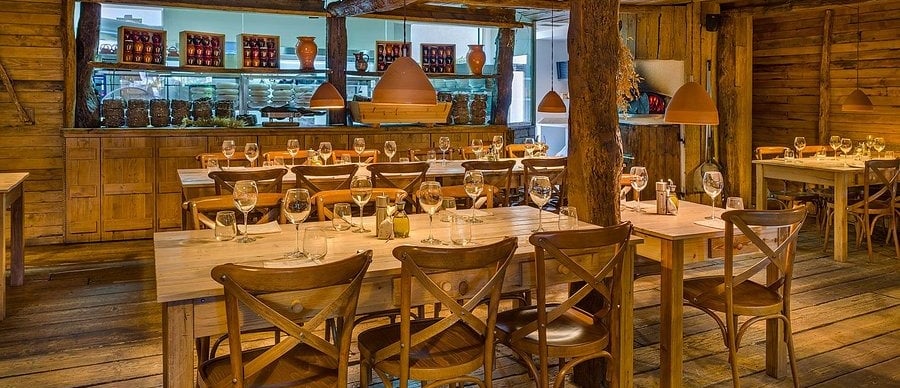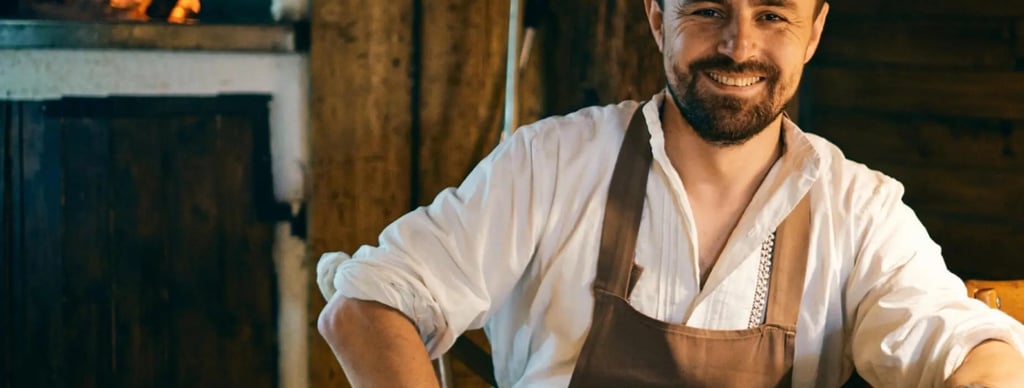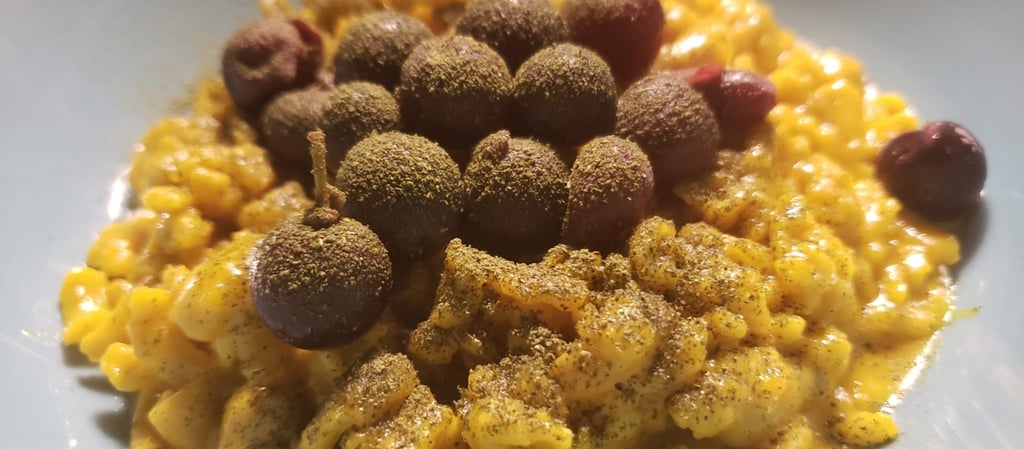Mullixhiu – Where Albanian Tradition Is Reborn on a Plate
Step inside a rustic mill in the heart of Tirana, and you’ll taste the soul of Albania—ground, simmered, and served with quiet brilliance.


A Doorway to the Past and Future
There’s a wooden door by the artificial lake in Tirana, near the government ministries and the bustle of the capital, that leads to another world. One of stone and wood, fire and flour. Step through it, and you enter Mullixhiu—not just a restaurant, but a declaration. A love letter to Albanian cuisine, a restoration of pride, and a slow, reverent act of culinary storytelling.
Mullixhiu means “the miller” in Albanian, and the name is no mere metaphor. Inside, the first thing you notice is the mill itself: ancient, whirring, real. It grinds native grains into flour, a feature that few restaurants today even attempt. This isn’t nostalgia. It’s continuity—the act of preserving something before it slips away.
Bledar Kola: The Chef Who Came Home
At the center of this story is Bledar Kola, the internationally trained chef who, after years of working in Michelin-starred kitchens across Europe—including Noma in Copenhagen—came back to Albania not to escape the fine dining world, but to elevate its own culture.
He didn’t come to build a temple of haute cuisine. He came to unearth the wisdom of his grandmothers. To reimagine forgotten recipes. To make Albanian food worthy of worldwide recognition.
And that’s what Mullixhiu has become: not a pretentious experiment in fusion, but a deeply researched, technically masterful, emotionally grounded celebration of authentic Albanian flavors.
Grain, Fire, and Memory
Mullixhiu does not traffic in clichés. There is no kitsch, no folk costume, no imitation of rusticity. The interior is warm, earthen, tactile. Shelves lined with pickled vegetables in jars, hanging dried herbs, woven baskets, and antique tools. The furniture is handmade, the wood unvarnished. There are no tablecloths—just the grain of the table beneath your elbow and the soft thrum of conversation.
Then, the bread arrives, baked from freshly milled flour, served with butter made in-house. The butter is smoked with beechwood. The bread cracks open with a grainy sigh and smells like fields in summer. It’s a prelude that speaks volumes: this place starts from the basics, and the basics here are sacred.
Tasting Albania, One Dish at a Time
There is no fixed menu at Mullixhiu. Dishes shift with the seasons, with what the foragers bring, with what the shepherds and cheesemakers deliver. One evening might begin with a shot glass of fermented corn water, slightly sour, slightly fizzy, a nod to ancient Albanian peasant drinks. It shocks the palate awake like a countryside morning.
Then, perhaps, a spoonful of trahana—the cracked wheat porridge of Balkan winters—reimagined with goat cheese, wild herbs, and something bitter and green that you can’t quite name, but can’t forget either.
Another dish might be gjellë me qepë, a slow-cooked onion stew that’s usually found in homes, not menus. At Mullixhiu, it comes reduced to its essence, dark and velvety, with lamb so tender it yields like memory. There might be a small bowl of fergese, the baked pepper-and-cheese dish of central Albania, here elevated with roasted garlic and heirloom tomatoes.
Desserts? Perhaps sheqerpare, the Ottoman-inspired syrup cookie, but deconstructed into a powder, a mousse, and a dream. Or a scoop of boza-flavored ice cream, made from the ancient fermented corn drink, drizzled with carob syrup and honey from Përmet.
The dishes are not large. But they are precise, poetic, even spiritual. Each bite is a conversation between now and then, between Tirana’s present and Albania’s rural past.
Practical Information
Address: Rruga Shëtitorja Murat Toptani, Tirana, Albania
Located near the Tirana Artificial Lake, within walking distance of the National Art Gallery and Presidential Palace.
Opening Hours
Monday to Sunday: 12:00 – 23:00
Reservations are strongly recommended, especially for dinner.
Price Range
Moderate to high by local standards: expect 3,000–6,000 ALL per person for a multi-course meal. Tasting menus and wine pairings are available.
Dietary Options
Vegetarian and gluten-free options available, but it's best to inform the staff in advance.
Atmosphere
Rustic, elegant, warm. Suitable for romantic dinners, cultural visitors, and culinary travelers.
Payment Methods
Credit cards accepted.
Languages Spoken
Albanian, English, Italian.
Contact & Reservations
Phone: +355 68 206 8800
Email: info@mullixhiu.al
For more information and bookings, visit the official website: www.mullixhiu.al


The Albanian Pantry Rediscovered
Mullixhiu is, at heart, about reclaiming ingredients: the things once dismissed as “peasant food” now brought back into the spotlight. Think mishavinë cheese aged in caves, wild nettles, dried cornflowers, mountain teas, and even beetroot leaves.
The olive oil is from Berat. The trout is from Valbona. The wine list is almost entirely Albanian, featuring Kallmet, Shesh i Zi, and Puls i Bardhë, all native grape varietals whose names might not appear on international wine menus—yet.
There’s also raki, of course. Plum, quince, grape. But here it is served with respect, paired like a spirit worthy of its ABV and history. You might get a shot with your dessert or before your soup. It belongs to all courses, because it belongs to all Albanians.
Warmth Without Performance
The service at Mullixhiu is neither overly formal nor too casual. Staff move with a sense of calm authority, as if each plate matters—which, of course, it does. Questions about the dish lead to stories. Ask where the cheese is from, and you’ll get the name of the supplier. Ask why the soup is cloudy, and you’ll hear about how mullaga leaves thicken broth naturally.
There’s a pride here. A quiet insistence that Albanian cuisine is not just food—it’s identity, resistance, and renaissance. This pride is not worn on the sleeve, but stirred gently into each course.
A Restaurant That Breathes
The architecture of Mullixhiu speaks the same language as the food. Recycled timber, reclaimed stone, hand-thrown ceramics—everything feels intentionally imperfect, like a village that grew over time. The open kitchen glows behind a row of wooden beams, and from time to time you catch glimpses of fire and iron pans.
In summer, diners spill out onto the shaded garden. There, the scent of fresh herbs, burning wood, and wildflowers fills the air. You might hear birds. Bustling Tirana disappears.
A National Culinary Awakening
Mullixhiu is more than a place to eat. It is the flagship of a culinary awakening in Albania, where young chefs, farmers, and food artisans are rediscovering what their ancestors already knew: that flavor lives in the soil, the hands, and the memory.
Bledar Kola has gone on to create slow food workshops, participate in international food summits, and train a new generation of Albanian chefs. But Mullixhiu remains his base—his home. It is the place where the wheat still grinds, the soup still simmers, and Albania still tells its story through salt, fire, and time.








